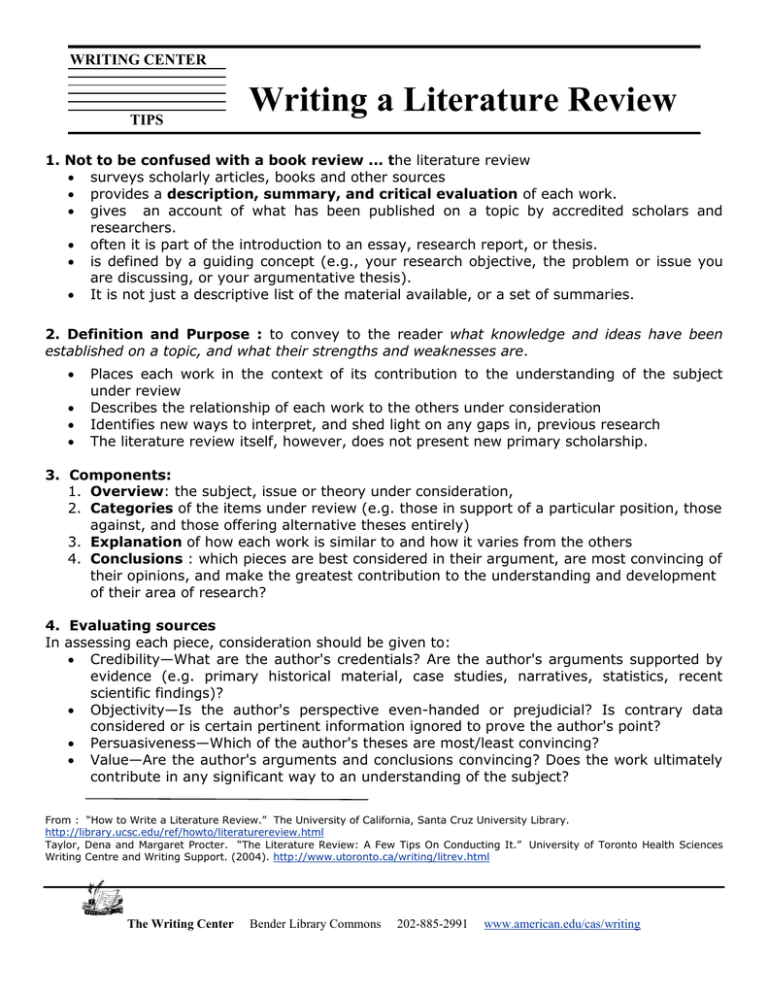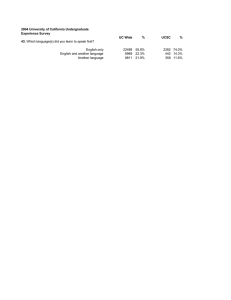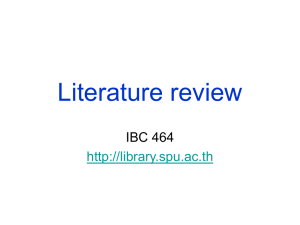Writing a Literature Review WRITING TIPS
advertisement

WRITING CENTER TIPS Writing a Literature Review 1. Not to be confused with a book review ... the literature review surveys scholarly articles, books and other sources provides a description, summary, and critical evaluation of each work. gives an account of what has been published on a topic by accredited scholars and researchers. often it is part of the introduction to an essay, research report, or thesis. is defined by a guiding concept (e.g., your research objective, the problem or issue you are discussing, or your argumentative thesis). It is not just a descriptive list of the material available, or a set of summaries. 2. Definition and Purpose : to convey to the reader what knowledge and ideas have been established on a topic, and what their strengths and weaknesses are. Places each work in the context of its contribution to the understanding of the subject under review Describes the relationship of each work to the others under consideration Identifies new ways to interpret, and shed light on any gaps in, previous research The literature review itself, however, does not present new primary scholarship. 3. Components: 1. Overview: the subject, issue or theory under consideration, 2. Categories of the items under review (e.g. those in support of a particular position, those against, and those offering alternative theses entirely) 3. Explanation of how each work is similar to and how it varies from the others 4. Conclusions : which pieces are best considered in their argument, are most convincing of their opinions, and make the greatest contribution to the understanding and development of their area of research? 4. Evaluating sources In assessing each piece, consideration should be given to: Credibility—What are the author's credentials? Are the author's arguments supported by evidence (e.g. primary historical material, case studies, narratives, statistics, recent scientific findings)? Objectivity—Is the author's perspective even-handed or prejudicial? Is contrary data considered or is certain pertinent information ignored to prove the author's point? Persuasiveness—Which of the author's theses are most/least convincing? Value—Are the author's arguments and conclusions convincing? Does the work ultimately contribute in any significant way to an understanding of the subject? From : “How to Write a Literature Review.” The University of California, Santa Cruz University Library. http://library.ucsc.edu/ref/howto/literaturereview.html Taylor, Dena and Margaret Procter. “The Literature Review: A Few Tips On Conducting It.” University of Toronto Health Sciences Writing Centre and Writing Support. (2004). http://www.utoronto.ca/writing/litrev.html The Writing Center Bender Library Commons 202-885-2991 www.american.edu/cas/writing Ask yourself questions like these about each book or article you include: 1. Has the author formulated a problem/issue? 2. Is it clearly defined? Is its significance (scope, severity, relevance) clearly established? 3. Could the problem have been approached more effectively from another perspective? 4. What is the author's research orientation (e.g., interpretive, critical science, combination)? 5. What is the author's theoretical framework (e.g., psychological, developmental, feminist)? 6. What is the relationship between the theoretical and research perspectives? 7. Has the author evaluated the literature relevant to the problem/issue? Does the author include literature taking positions she or he does not agree with? 8. In a research study, how good are the basic components of the study design (e.g., population, intervention, outcome)? How accurate and valid are the measurements? Is the analysis of the data accurate and relevant to the research question? Are the conclusions validly based upon the data and analysis? 9. In material written for a popular readership, does the author use appeals to emotion, one-sided examples, or rhetorically-charged language and tone? Is there an objective basis to the reasoning, or is the author merely "proving" what he or she already believes? 10. How does the author structure the argument? Can you "deconstruct" the flow of the argument to see whether or where it breaks down logically (e.g., in establishing cause-effect relationships)? 11. In what ways does this book or article contribute to our understanding of the problem under study, and in what ways is it useful for practice? What are the strengths and limitations? 12. How does this book or article relate to the specific thesis or question I am developing? 5. Further Resources Cooper, H. (1998). Synthesizing Research: A Guide for Literature Reviews. Thousand Oaks, California: Sage Publications. (call number H62 C5859) Galvan, J.L. (1999). Writing Literature Reviews. Los Angeles: Pyrczak Publishing. (call number H61.8 G3) Macauley, P. (2001). The Literature Review. Geelong, Victoria, Australia: Deakin University. Retrieved 15th October 2001 from the World Wide Web: http://www.deakin.edu.au/library/findout/research/litrev.html The University of Wisconsin-Madison Writing Center. (2001). “Writer's Handbook: Academic Writing: Reviews of Literature.” Madison, Wisconsin: Author. Retrieved 15th October 2001 from the World Wide Web: http://www.wisc.edu/writing/Handbook/ReviewofLiterature.html This handout was composed with information from the following sources: “How to Write a Literature Review.” The University of California, Santa Cruz University Library. http://library.ucsc.edu/ref/howto/literaturereview.html Taylor, Dena and Margaret Procter. “The Literature Review: A Few Tips On Conducting It.” University of Toronto Health Sciences Writing Centre and Writing Support. (2004). http://www.utoronto.ca/writing/litrev.html The Writing Center Bender Library Commons 202-885-2991 www.american.edu/cas/writing

